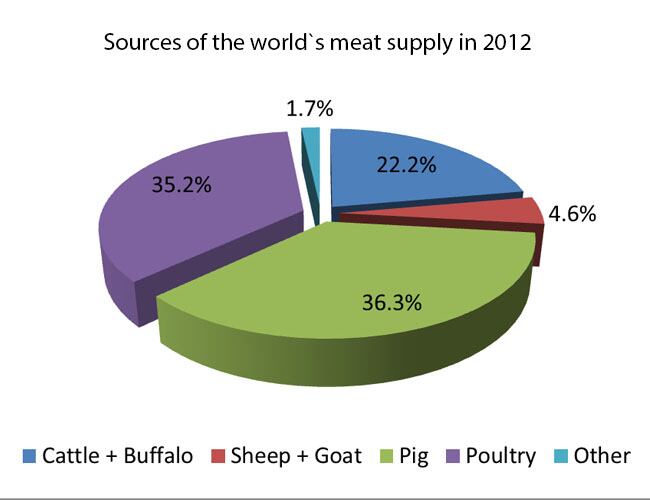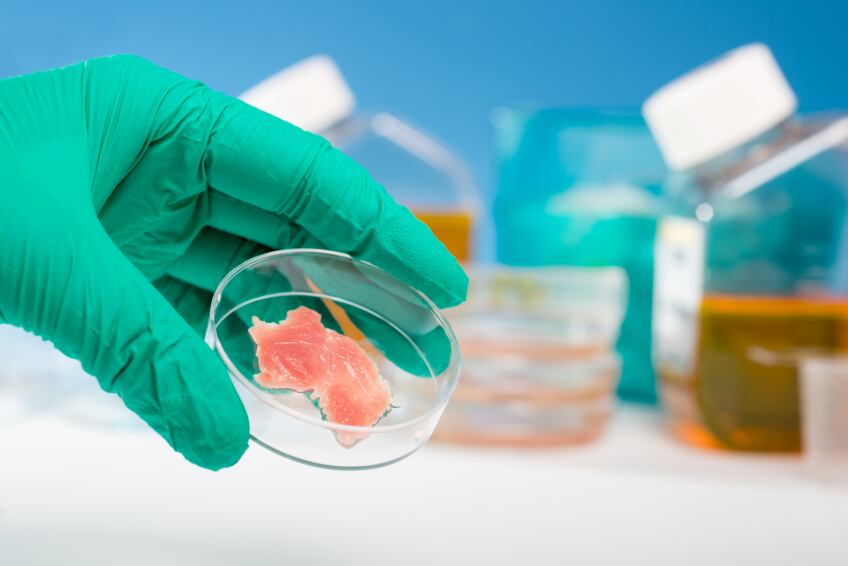Four years ago, Mosa Meat's chief scientific officer Mark Post showcased the world's the very first clean meat burger. Made of muscle fibre produced without killing an animal, it had the texture of meat, but not the flavour or colour.
Since then, Post and Mosa Meat's chief executive officer Peter Verstrate, have been working on creating food-grade fat tissue and heme, the iron-containing molecule carried by myoglobin, that is responsible for the taste, aroma and colour of meat, as well as scaling up production.
Food meats pharma
They are getting closer to creating what Verstrate calls 'Burger 2.0'.

Mosa Meat recently closed its first round of funding from “a group of mission-driven investors from the US” and is now hiring staff with the money. It also expects to close a second, larger round by the end of this quarter with two lead investors from the pharmaceutical and food industries.
The ‘food’ that is given to the in vitro meat cells – known as the culturing medium – is currently produced by the pharmaceutical industry, hence its interest in expanding this value chain.
‘These are real strategic investors who like what we do because they think it might be part of their future,” says Verstrate.
On the plate in 3 years
“We’re 70 to 80% there”, Verstrate told us, and Burger 2.0, produced on a lab-scale, should be rolled out in about one and a half to two years.
Unlike SuperMeat, which has said it will launch a clean meat product that is price-competitive to conventional meat, Verstrate says Mosa Meat will enter the market, targeting high-end restaurants, once it reaches “an extremely premium but sellable price”.
“It will be a statement, not a commercial venture," he adds.
The Maastricht-headquartered firm foresees an additional 12 months to then scale-up production and launch on a commercial scale.
Mosa Meat has also factored in the time needed to apply for EU novel food status in this three-year time-frame, and Verstrate was pleased to see cultured meat referenced in the new, streamlined regulation, published on 1 January this year.
Pork without pigs, milk without cows...
Cellular agriculture is one of the most cutting-edge spaces in food technology today, promising to change the fundamental structure of the entire food supply chain.
Peter Verstrate will be discussing its potential at PROTEIN VISION, a three-day industry event in Amsterdam in March.
Re-creating the meat the world eats
There are a handful companies developing cultured meat: Mosa Meat in the Netherlands, Future Meat Technologies and SuperMeat in Israel, Memphis Meats, Finless Foods and Hampton Creek in the US and Integriculture in Japan. (New Jersey-based Modern Meadow has pivoted from food to other applications such as animal-free leather), which between them, have the three most commonly eaten animals in the world covered.

According to 2012 FAO data, 36.6% of the meat we eat comes from pigs, 35.2% from poultry and 22.2% from cattle. However, chicken is the fastest growing (it has more than doubled since 1990) and it is tipped to be the global number one by 2020.
Mosa Meat has been focussing on beef – the least sustainable source of food in terms of methane emissions, land impact, feed requirements and energy conversion – while SuperMeat is working on chicken and Memphis Meats' portfolio includes pork, beef and chicken.
Last year Hampton Creek, best known for its vegan mayonnaise, announced it was entering the clean meat space with a product that was “likely [to be] in the avian family” but with plans to build a “multi-species, multi-product platform spanning the entire range of meat and seafood”.
‘Four companies in a $1 trillion market - competition is not an issue’
Is there a lot of pressure between these food tech firms to be the first to launch a product?
“It depends what drives you,” Verstrate says. “We, Mark Post and myself, are mainly driven by desire to solve a problem – meat production getting out of hand – so the sooner it comes to market the better.
“If there’s a breakthrough in the US or Israel before us, it will at least be a good starting point. I personally would be fine with that. The value of market for meat globally is more than one trillion dollars. Four companies in a shared field is not an issue.”
Lab meat versus plant proteins
Suppliers and manufacturers agree on the need for healthy, sustainable protein to feed a population of 9 billion by 2050, and in terms of new product launches, plant-based products seem to be leading the way. But Verstrate believes their market share will only go so far.
“There are many meat analogues on market and they all have ambitions to replace meat since the 1970s. Plant-based products are getting better but their market share so far is 1% of the value of the conventional meat industry. That might increase to 5, 10 or even 20% in the far future.
“But the bulk of meat is hard to replace with plant-based proteins. Meat has such an emotional role in our diets [...] For the majority, it has to be meat. We might as well stop if we don’t get that.”

The idea of tissue cells breeding in a petri dish and then mass producing them in stainless steel bioreactors is hardly the stuff of emotional connections either, though.
Verstrate agrees. Grass-fed cattle that roam freely on the Argentinian pampa, overseen by a gaucho on horseback – “you won’t replace that picture with this technology”, he says.
But the majority of global meat production comes from animals packed into cages with no natural light and little room to move.
The kind of meat used to produce a bucket of KFC chicken wings or a €2 bacon sandwich comes from factories, not farms. Most people know it but choose not to dwell on it because they enjoy the taste, texture, sensory characteristics of meat and the culinary heritage that we have built up using meat.
Cultured meat will have the very same traits but be animal-free, Verstrate says.
'We want to label it vegetarian'
That brings us to another major challenge to overcome: growing meat from a culture medium that isn't based on bovine serum.
“We want to be ethical and to be able to call the product vegetarian. Serum is the least animal friendly product in the world, it’s extracted from unborn calves. We definitely won’t go to market with that in it.”
In vitro meat, lab meat, cultured meat or clean meat?
The English-speaking is gradually adopting the term clean meat, helped by a campaign led by The Good Food Institute.
But it doesn’t necessarily translate well into other languages. In Verstrate’s native Dutch, for example, it means a piece of meat that has been washed with soap and water.
The yuck factor
Overcoming the yuck factor associated with clean meat may actually be less of a barrier in Europe than for insects.
Studies have shown that consumers from southern European countries, which have established culinary traditions, seem to be fairly reticent while consumers from the UK, Netherlands, Belgium and the US are the most receptive.
Somewhere between 40 and 60% said they would try clean meat, while 10 to 20% are disgusted by the ‘Frankenfood’ and the rest don’t know.
“It seems to be a reasonable adoption rate,” says Verstrate.
